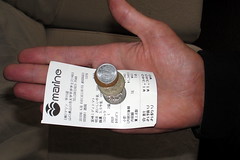Monday, October 18, 2010
Change as Till Reciept Papaerweight
I thought it was only me that got pissed off with the way that all till operators use ones change as a paper weight for the receipt that few people want. If you are holdilng your purchase in your other hand it is difficult to throw the reciept away without dropping your change.
I found out recently that a Japanese 'comic folk band' Briefs and Trunks complained about this in their hit song Konbini (Convenience Store). But still the tellers keep doing it, at every store in Japan.
The main reasons for this beahviour is, that if you are going to give someone a reciept into their single outstretched hand, there is very little option. If the teller were to put the reciept on to of the change, it would probably fall off. The issue is not so much where their put the reciept, but that they give it to you at all. Do I look like I want a reciept for my ice lolly?
The cultural issue focuses on the importance of reciepts and the reasons for them are more complex. So many people, especially housewives keep detailed accounts of all their expenditure so treasure their reciepts, Japanese like visual signs and a visual record of a transaction, Japanese people like to exchange so even though there is a transaction of money for goods the reciept is another thing that the buyer gets in return for their money, even though Japan is one of the safest most crime free places in the world (and one of the reasons why it so) the Japanese like to avoid conflict at all costs and the existence of a receipt reduces potential conflict over the amount tendered, the Japanese like little pieces of paper (which is a homonym for God), the Japanese like wrapping (see "Wrapping Culture" by Joy Hendry) and perhaps the reciept wraps the deal.
I found out recently that a Japanese 'comic folk band' Briefs and Trunks complained about this in their hit song Konbini (Convenience Store). But still the tellers keep doing it, at every store in Japan.
The main reasons for this beahviour is, that if you are going to give someone a reciept into their single outstretched hand, there is very little option. If the teller were to put the reciept on to of the change, it would probably fall off. The issue is not so much where their put the reciept, but that they give it to you at all. Do I look like I want a reciept for my ice lolly?
The cultural issue focuses on the importance of reciepts and the reasons for them are more complex. So many people, especially housewives keep detailed accounts of all their expenditure so treasure their reciepts, Japanese like visual signs and a visual record of a transaction, Japanese people like to exchange so even though there is a transaction of money for goods the reciept is another thing that the buyer gets in return for their money, even though Japan is one of the safest most crime free places in the world (and one of the reasons why it so) the Japanese like to avoid conflict at all costs and the existence of a receipt reduces potential conflict over the amount tendered, the Japanese like little pieces of paper (which is a homonym for God), the Japanese like wrapping (see "Wrapping Culture" by Joy Hendry) and perhaps the reciept wraps the deal.
This blog represents the opinions of the author, Timothy Takemoto, and not the opinions of his employer.

